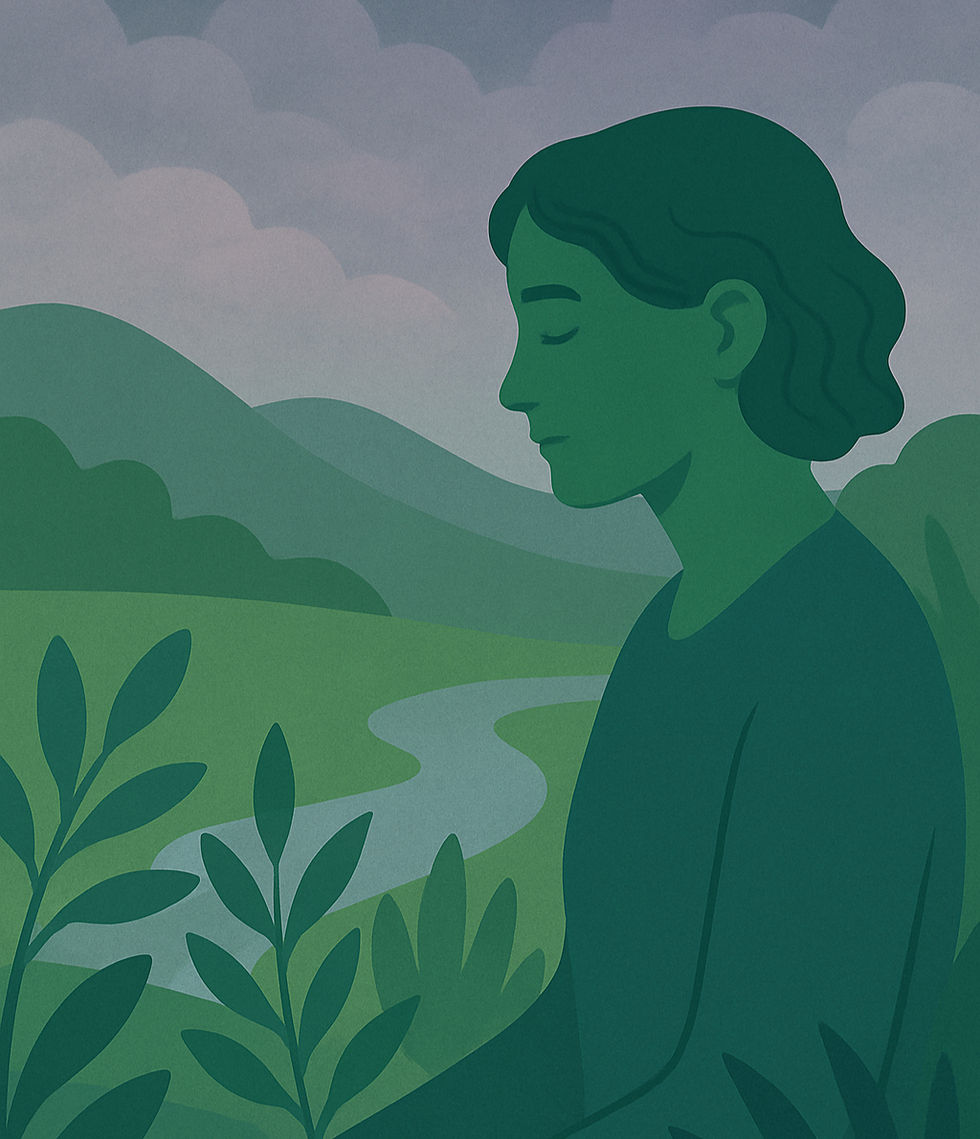Nature and the Nervous System: How Time Outdoors Can Help You Feel Calmer
- elizabethkeanthera
- Jul 21, 2025
- 3 min read
Stress is something most of us live with daily, often without realising how deeply it affects our bodies and minds. Whether you are recovering from trauma, living with anxiety, or simply feeling overwhelmed, reconnecting with nature can be a powerful and accessible way to find more calm.
You may have heard that spending time outdoors is “good for you,” but research now helps us understand exactly how and why. A study published in Frontiers in Psychology found that taking a short “nature break” of 20 to 30 minutes significantly reduced cortisol, the hormone that rises in response to stress. In fact, cortisol levels fell by 21.3 percent beyond the expected 11.7 percent natural drop per hour that happens as part of the body’s usual rhythm (Hunter et al., 2019).
Participants in the study were not exercising or hiking. They simply sat or walked in a natural setting without using phones, reading, or engaging with screens. This quiet, intentional time created measurable changes in their stress physiology.

Why Nature Helps Us Settle
Modern life often pulls our attention in a hundred directions. For those who have experienced trauma or prolonged stress, it can be especially hard to feel safe in stillness. According to polyvagal theory (Porges, 2011), when our nervous system doesn’t feel safe, it can become stuck in survival states like anxiety, dissociation, or shutdown.
Natural spaces gently cue the body toward safety. Soft light, rustling leaves, birdsong, and the rhythm of walking all help the nervous system regulate itself. Unlike busy environments or screens, nature offers a non-demanding, grounding presence that allows us to return to ourselves.
Somatic therapist Peter Levine reminds us that trauma lives in the body as much as the mind. For some people, being outdoors may feel safer than being still indoors. The environment itself becomes a co-regulating force, inviting the body to unwind at its own pace.
The Science of Nature Breaks: What Really Works?
The same study by Hunter et al. (2019) highlights two clinical insights worth noting:
Timing matters.The biggest drop in cortisol was observed when participants spent between 20 and 30 minutes in nature. Shorter durations had less of an impact, and longer times still helped, though with diminishing returns.
Stillness and simplicity matter.Being in nature was only part of the benefit. The absence of screens, multitasking, and performance also contributed to the reduction in stress. In other words, how you are in nature may be just as important as where you are.
Gentle Ways to Connect with Nature
You don’t need to be “outdoorsy” or have access to a forest to benefit from this research. Here are some ideas for making nature a supportive part of your life:
Try a mindful 20-minute walk.Choose a local park, a quiet street lined with trees, or a garden. Walk slowly. Let your gaze soften. Notice the colours, light, and movement around you.
Sit quietly outdoors.Find a bench, doorstep, or patch of grass. Let yourself do nothing for 20 minutes. No phone, no goals. Simply breathe and observe.
Engage the senses.Look for texture in leaves. Listen to the birds or the breeze. Smell the earth after rain. Sensory awareness helps anchor you in the present moment.
Let nature meet you where you are.You don’t need to feel calm before you go outside. Nature can hold whatever you’re bringing—anxious thoughts, heavy feelings, numbness. Let the environment do the work of co-regulation.
Bring nature indoors.If going out isn’t always possible, sit near a window, add plants to your space, or play nature sounds. These small changes can still signal safety to your nervous system.
Final Thoughts
Nature is not a magic cure, but it is a steady and accessible support for a nervous system under strain. For those healing from trauma, navigating anxiety, or simply wanting to reconnect with their bodies, nature offers a way to settle without words or pressure.
If you're seeking therapy that honours the connection between mind, body, and environment, I offer trauma-informed sessions online and in-person in Horsham, West Sussex. Together, we can explore tools that help you feel more grounded, including how to reconnect with the natural world in a way that feels safe and healing.
You are not alone. Support is here when you're ready.




Comments